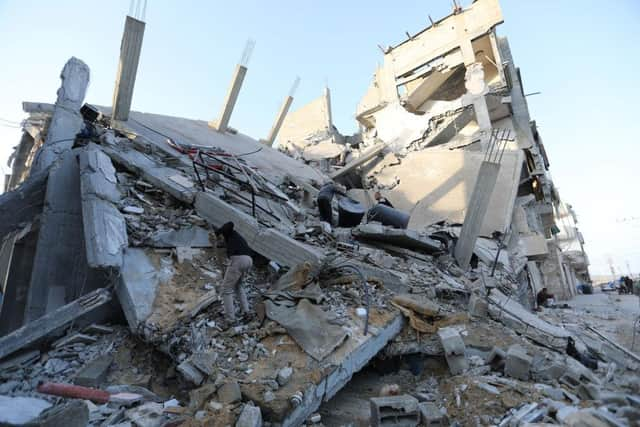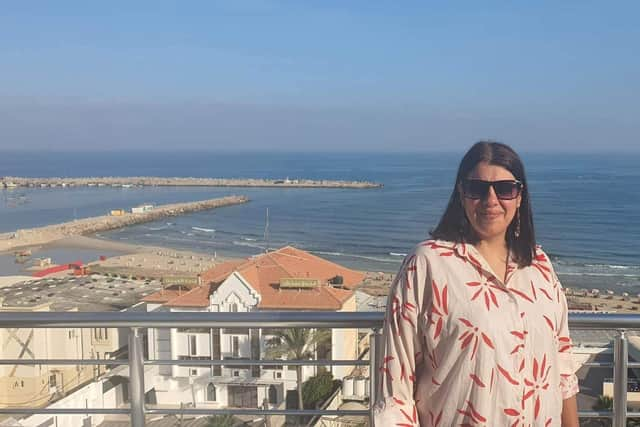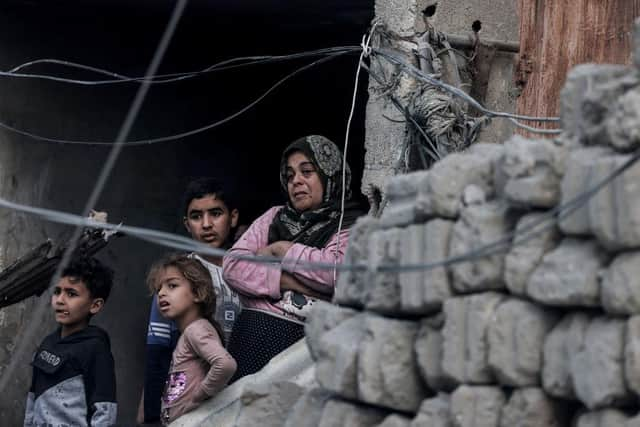Gaza-Israel six months on: 'I believed Gaza would be bombed, but not to this degree', says aid worker as the conflict reaches the six month mark
When Palestinian aid worker Riham Jafari wakes up every morning, she checks her phone for news from her colleagues operating on the ground in Gaza.
"Their messages on WhatsApp each morning are: ‘We are alive. We are still alive’," she says. “These are the messages we receive from our colleagues, from our workers, from our partners.
Advertisement
Hide AdAdvertisement
Hide Ad"We feel very sad and powerless that we cannot do anything for them.”


An advocacy and communications coordinator for charity ActionAid based in the West Bank, Ms Jafari travelled to Gaza frequently before the war.
Now, six months to the day since the conflict began, the places she remembers as “beautiful” beachside neighbourhoods in Gaza City have been destroyed: decimated by retaliatory bombing raids following the 7 October Hamas attacks on Israel which killed 1,000 people.
She recalls the day that Hamas militants stormed Israeli border fences – and braced herself for the repercussions.
"I was on my way to my office, and when I saw the situation, I believed Gaza would be bombed, but not to this degree,” she says. “We thought there will be war like other previous wars, we have seen this before, but we did not imagine that this war would extend for six months, that it would take this number of victims and cause this huge damage for infrastructure – or that hunger and famine would be used as a weapon of war.”


According to the most recent figures from Gaza's Hamas-controlled Ministry of Health, more than 31,000 Palestinians have been killed since the retaliatory attacks began, and over 73,000 more wounded in the ongoing bombardment.
Meanwhile, a total of 1.7m people of Gaza’s two million population have been displaced from their homes and forced to live in refugee camps and increasingly, temporary structures such as tents and under tarpaulins. Humanitarian organisations have warned of mass starvation in the population due to blocks on aid accessing Gaza, sparking international calls for a ceasefire.
In Rafah, near the Egyptian border, where more than half of Gaza’s population has settled following heavy bombardments on other parts of the territory, Israel is still believed to be mulling a ground assault, following days of air strikes on what it says are Hamas targets in the city.
Advertisement
Hide AdAdvertisement
Hide AdUS officials have warned that a ground operation in Gaza would be a “mistake”, stressing that civilians trapped in the city have nowhere else to go, while the city also acts as the main gateway for humanitarian aid delivery, via Egypt.


A recent US-led initiative to air drop essential supplies and also build a floating pier in Gaza to allow aid access – while not without its own controversies – initially offered a glimmer of hope for starving residents.
Then, earlier this week, a convoy carrying seven aid workers from the food aid charity World Central Kitchen was hit by an Israeli air strike, killing all of those inside – and forcing the suspension of the organisation’s operations.
Israel has taken responsibility for what it called an “unintentional” strike, saying it was a “grave mistake”.
However, Ms Jafari says the attack has taken the fear among her Gazan colleagues to a new level.


“They know that there is no safe place in Gaza,” she says, pointing to the attack on WCK, which occurred despite the charity informing the Israeli military of its coordinates. WCK’s director has since claimed the attack was targeted, something Israel denies.
"So all the time they are worried and they are scared because they believe that there is no safe place,” she says. “They expect this killing at every moment.”
To compound the situation, most aid workers in Gaza are themselves refugees.
Advertisement
Hide AdAdvertisement
Hide Ad"Imagine that after you were living for years, in a good house, with all infrastructure, you suddenly become displaced in a few minutes,” Ms Jafari says.
“They tell me in Arabic, ‘We have had enough, we are tired, we are exhausted. We need a ceasefire’.”
UNRWA, the United Nations agency set up 75 years ago to provide relief to all refugees resulting from the 1948 Palestine War, coordinates the vast majority of aid effort in Gaza, from the logistics of aid entering through crossing points to physical warehouses. Before the recent conflict, it operated schools for almost 300,000 refugee children within Gaza. Since 7 October, the schools have been turned into refugee camps, many of them now damaged or destroyed as a result of the conflict.
UNRWA hit a major obstacle when, in January, Israel said 12 members of its 13,000 staff had been involved in the Hamas attacks. UNRWA subsequently fired the staff members allegedly involved, but warned of a “deliberate and concerted campaign” by Israel to “undermine [UNRWA’s] operations, and ultimately end them”.
Countries around the world, including the UK, pulled funding for UNRWA, leaving the organisation to issue warnings that the fate of the organisation was “hanging in the balance” and may not have enough funding to continue its operations. Some nations, including Japan, Canada and Sweden, have since reinstated their financial aid, however, the UK is not yet among them.
Sam Rose, director of planning at UNRWA, who returned to the UK from Gaza last week, says the past six months has been among the most tumultuous in the organisation’s history.
"It had been relentless since 7 October and at times this stuff just gets quite surreal,” he says. “There were a couple of weeks where it felt quite existential: that if Israel continued to bombard the system with with allegations and counter allegations and dirty politics, that we just wouldn't be able to respond to it all.
"But when you're in Gaza, you can't imagine a situation where UNRWA wouldn't be operating, because without UNRWA, there wouldn't be an aid operation in Gaza.”
Advertisement
Hide AdAdvertisement
Hide AdHe describes the conditions on the ground as “post-apocalyptic”.
“You can't imagine it getting any worse - and then it gets worse,” he says. “The situation is beyond belief in terms of the conditions that people are being forced to live in.
"In Rafah, just over a million people are wandering around looking for water, looking for bits of food. It feels very post-apocalyptic that people are reduced to this.
"Longer term, people wonder when are they ever going to be able to go back to something like a normal life. Some people say they want to leave, or be put out their misery, because you can't live like this.”
In Israel, there is a growing mutiny against Mr Netanyahu’s government, which has taken a hard line on the conflict. Protests have broken out in major cities, calling for the prime minister’s resignation, as well as for a ceasefire in Gaza.
Six months ago today, the country was reeling from the unprecedented attack which saw militants storm the border to target a number of kibbutz communities, as well as a music festival, brutally killing 1,000 people and taking hundreds hostage. While some of the hostages have since been released, others are still in captivity, with fears for their safety growing by the day.
Newton Mearns-born soldier Richard Hecht, whose family relocated to Israel 40 years ago, found himself at the centre of the world’s media attention as the international spokesman for the Israeli Defence Force (IDF). In an interview given just days after the 7 October attacks, Lieutenant Colonel Hecht, who stepped down from his post earlier this week, told media that the Israeli military that Israel wanted "all people that came into Israel [Hamas] to be dead”.
Since then, the Israeli government has adhered closely to that narrative, vowing it will not stop until it has wiped out Hamas in Gaza. While Western governments initially pledged their unwavering support for Israel back in October, the single-mindedness of its actions have caused rifts with governments across the globe.
Advertisement
Hide AdAdvertisement
Hide AdLast month, the United States, long one of Israel’s staunchest allies, abstained from a vote to allow the United Nations Security Council to finally pass a resolution to demand an immediate ceasefire for the Muslim fasting month of Ramadan and the immediate and unconditional release of all hostages. It has not been implemented by either side.
Peter Jackson, professor of global security at Glasgow University, says Israel’s relationship with Western governments has taken a severe blow over the past six months.
Israel’s ambassador to the UK was summoned to the Foreign Office for the first time in 12 years on Tuesday, after it emerged three British Citizens had been killed as in the air strike on the WCK convoy. Separately, prime minister Rishi Sunak told Mr Netanyahu directly that he was “appalled” at the killings, that too many aid workers and civilians had died and the situation was “increasingly intolerable”.
"I think as long as the Netanyahu government is in place, relations with Europe and the United States - but especially Europe, France, and Britain - are going to to be increasingly dire,” Prof Jackson says. “Israel is losing so much of the sympathy that it had in the solidarity at the very beginning of this tragedy, without really getting much closer to achieving its aim of destroying Hamas.
"But it's important to remember that the United States – and almost certainly the UK - is continuing to sell arms to Israel. While they're saying on the one hand that there needs to be a ceasefire and putting increasing pressure on the Israeli government, the only pressure that's going to have any effect, realistically, is American pressure, but as long as they're still providing military support, I don't see any hope that Israel will be reined in.”
Prof Jackson fears there is no short-term solution to the problem.
"At the moment, things don't look like there's much hope of peace,” he says. “There's probably hope for short term ceasefires, that is something that might be negotiated, but the problem is and it's something that I think we forget, Israel cannot live with Hamas in power in Gaza.
"Israel has done exactly what Hamas would have wanted it to do, which is basically mount a campaign which killed many thousands of Palestinian civilians. And Israel has basically fallen into their trap and has mounted campaigns which can be seen as collective punishment under international law.”
Advertisement
Hide AdAdvertisement
Hide AdHe points to Hamas’ achievement of putting the idea of a two-state solution back into international discussion.
In January, UK foreign secretary David Cameron said the UK would consider recognising Palestine as a state – something which is strongly opposed by Mr Netanyahu’s government. Lord Cameron said Palestinians need to be shown “irreversible progress” towards a two-state solution, which would create an independent State of Palestine alongside the State of Israel.
"People are now talking about a two state solution again, in a way that [had] slipped off the international agenda,” Prof Jackson says. “Israel now is much more isolated than it ever was before, which is another Hamas objective. And, in terms of the focus of world opinion, it's now less on Hamas and more on Israel in terms of committing atrocities. All of these things are important.”
Comments
Want to join the conversation? Please or to comment on this article.
